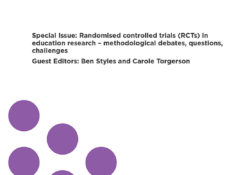tandfonline.com – Randomised controlled trials in Scandinavian educational research
tandfonline.com har udgivet en rapport under søgningen “Teacher Education Mathematics”: ABSTRACT ABSTRACT Background: The Scandinavian countries have a long history of implementing social interventions, but the interventions have not been examined using randomised controlled trials until relatively recently compared with countries like the United States and the United Kingdom. Purpose: The purpose of this paper is to examine the history of randomised controlled trials in Scandinavian compulsory schools (grades 0–10; pupil ages 6–15). Specifically, we investigate drivers and barriers for randomised controlled trials in educational research and the differences between the three Scandinavian countries Denmark, Norway, and Sweden. Methods: To locate relevant trials, we performed a systematic search of four bibliographic databases and a search for grey literature. Results were combined with trials located through direct contact with researchers and… Continue Reading
